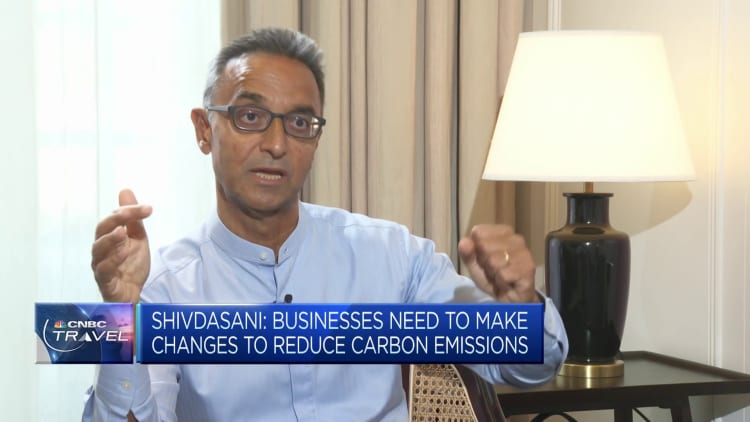Many hotels claim to be eco-friendly.
But are they?
A quick-and-easy test is to look for two items, said Sonu Shivdasani, founder of Soneva and Six Senses hotel brands.
First, sustainable hotels should not have branded water of any sort, he told CNBC Travel.
“When you have incredible filtered water, and where the tap water is pretty pure in most countries in the world … there’s no need to have any sort of branded water,” he said.
Not only does this reduce single-use bottles, but it’s healthier too, he said.
“There are quite a lot of brands of water that can be quite toxic, because they’re in areas where there’s sort of chemical pollution,” he said. Plus “plastic bottles are a carcinogen. You can imagine … that plastic bottle … sitting in a store for two or three months, getting hot and roasting.”
A better, cheaper option for hotels is to purify tap water and add electrolyte minerals, such as sodium, potassium and chloride, he said.
Next, check for toiletries in plastic bottles, which Shivdasani called “silly.”
“One should really buy in bulk containers, and then you refill in ceramic bottles,” he said.
But that’s really the bare minimum, said Shivdasani, who sold Six Senses in 2012.
He now focuses on Soneva’s three hotels: two in the Maldives and one in Thailand, plus another — Soneva Secret — set to open on a remote atoll in the northern Maldives in 2024.
The resorts serve guests produce grown on-site, rely partly on solar energy and recycle 93% of generated waste, said Shivdasani, who was awarded the 50 Best Hotels inaugural “Icon Award” for responsible luxury tourism in September.
‘Ecology is economy’
Shivdasani rejects the idea that operating sustainably is costlier.
“Ecology is economy,” he told CNBC Travel.
By relying more on solar power than diesel fuel, he said, Soneva resorts will save money in the long run.
“Our bankers are very supportive of us doing it,” he said. “The payback on this investment is about four and a half years.”

By making charcoal using fallen branches, Shivdasani estimates his company saves $20,000-$30,000 per year. Plus, on-site gardens deliver about $10,000 a month of vegetables — at market prices — into each resort, he added.
But Shivdasani doesn’t dispute that sustainability — at this level — is harder.
“It’s certainly not easier. But it’s more interesting,” he said. “It is more difficult, but it’s certainly much, much more fulfilling.”
A 2% environmental levy
As the tourism industry adopts more sustainable…
Click Here to Read the Full Original Article at Top News and Analysis (pro)…


